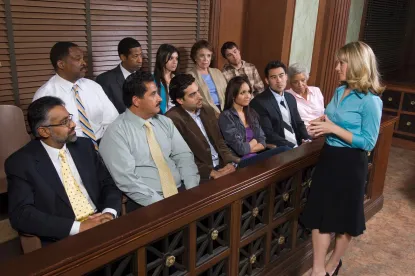It’s a different world than when most of us graduated from law school or entered the legal profession. In 2016, TIME reported on a study by UCLA’s Williams Institute, which estimated 0.6% of the country’s population identified as transgender—a number that translated to 1.4 million Americans at the time, and a figure that was double estimates from five years prior.
In the years since that study, the numbers have likely increased, as gender fluidity has become more widely recognized in private and public sectors. Indeed, you may have seen “all gender” restrooms at airports across the country, and some employers are extending insurance coverage for gender reassignment procedures. Multiple states now allow an “X” gender marker on identification cards.
Regardless of your feelings on these issues, there’s no denying that today’s gender landscape is changing. And it’s not just trans individuals who are asserting their rights. The #MeToo and Time’s Up movements have shed light on how many women feel marginalized both in and out of the workplace, and it wasn’t too long ago that the United States Supreme Court legalized same-sex marriage in all 50 states.
You may think that issues of gender identity, sexual orientation, and familial status have no relevance to your legal practice, but if you’re trying cases before a jury, you’d be remiss to ignore the saliency of these issues for many members of your audience.
Although we’ve previously written on the importance of attorney etiquette and certain things to avoid in voir dire, the topic of gender deserves special consideration. After all, you may be offending jurors—the deciders of your case—without realizing it, even when your intentions are good.
Be Mindful of the Mrs.
Starting with the easiest behavior to fix, how you address female jurors can make a big impact on how they feel about you. I’ve witnessed several cringe-worthy moments when attorneys (usually males) make the mistake of referring to every female panelist as a “Mrs.” As their colleague, I know they mean no harm, but as a single woman, I can sympathize with the jurors who need no reminder of their singlehood.
Whether single by choice, recently divorced, or left at the altar, many single women find it offensive when others assume they are married. I brought this to the attention of a client of mine recently who was on the receiving end of a few eye-rolls during voir dire, and he hadn’t even realized his habit.
But, it’s an important habit to break. To avoid this misstep in the future, I recommend recording the proper prefix on your jury list or seating chart, and when in doubt, “Ms.” is usually a safer bet.
Marriage May Not Be Husband and Wife
Prior to 2003, attorneys could be confident that any juror who checked the “married” box had a husband or wife of the opposite sex waiting for them at home. But with the legalization of gay marriage, this assumption has been the source of many embarrassing moments for trial counsel around the country.
As of June 2017, over one million people in the United States were married to someone of the same sex, and 4.3% of adults in the United States identified as Lesbian, Gay, Bisexual, or Transgender (LGBT). Although still a minority, if you’re trying enough cases, you’re sure to come across a number of jurors with a spouse of the same sex.
Yet, time and time again, I hear counsel ask female jurors about their “husbands” and male jurors about their “wives” when there is no indication of the gender of either.
Most LGBT jurors are quick to correct the assumption, but for the attorney asking the question, the damage has been done. Not only has the attorney likely offended the responding juror, but potentially others in the panel as well. While you may be able to strike the former, there’s no telling whether others will end up on your jury and hold your slip-up against you or your client.
It may take some practice, but it would be wise for counsel to get in the habit of using the gender-neutral term “spouse” when posing questions to married jurors about their significant others.
When They’re Neither a Mr. Nor a Mrs.
Most juror questionnaires ask panelists to indicate a gender, but oftentimes, there are only two options. Some courts are now adopting alternative approaches to gathering information on juror gender.
For example, rather than asking directly for gender, some have started asking, “What gender do you identify with?” Others are allowing jurors to check a third box. In California, where questionnaires previously asked jurors to circle “Mr.,” “Ms.,” “Mrs.,” or “Dr.,” some attorneys have revised the question to add a “Mx.” option. And just earlier this year, the New York Supreme Court revised its standard jury questionnaire; rather than asking jurors to check a box, the question now asks, “How do you prefer to be addressed? (Ms., Mr., Juror, Other): __________.”
These measures serve as a good reminder for counsel, and even in states where these changes have not been implemented, attorneys may request similar modifications to existing questionnaires.
Still, it will take some getting used to for many. During a jury selection in New York City earlier this year, one juror with a traditionally female name indicated “Juror” as the reference to be used when being addressed. Despite this, and to the ire of the juror, opposing counsel proceeded to repeatedly call this person “Ms.” Thankfully, I was able to alert my client before he made the same mistake.
In this instance, “Ms.” was not the safer bet; indeed, our internet research of prospective jurors had even revealed that this juror was both an accomplished attorney and the first New Yorker to receive a gender X marker on the city’s municipal identification card, as well as the author of a passionate article about the importance of accurate identifiers to reduce violence and discrimination against the trans, nonbinary, and gender-nonconforming community.
Clearly, this was an important issue for the juror—a likely leader of the jury—and I hope we gained their favor by addressing them by their preferred pronoun.
Final Thoughts
Issues related to gender identity, sexual orientation, and familial status may be controversial subjects, but irrespective of your position on these matters, no attorney should needlessly risk offending the very jurors who will be deciding the fate of their client.
Shifting landscapes often mean shifting practices, and in some instances, a little mindfulness can go a long way.




 />i
/>i
